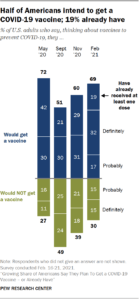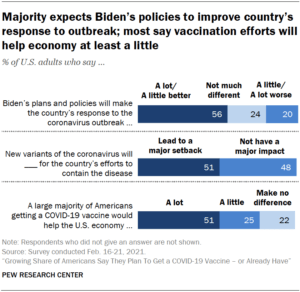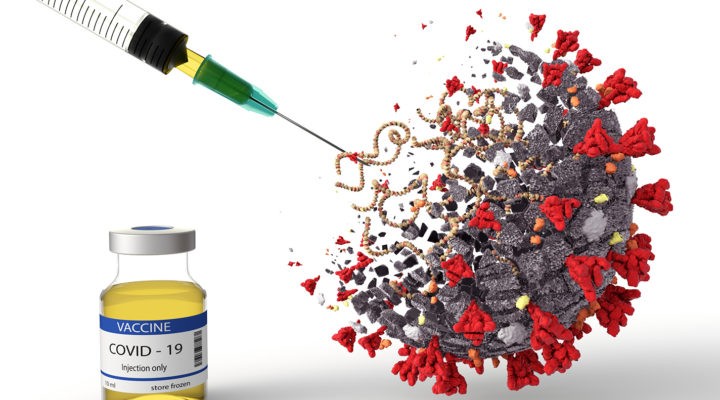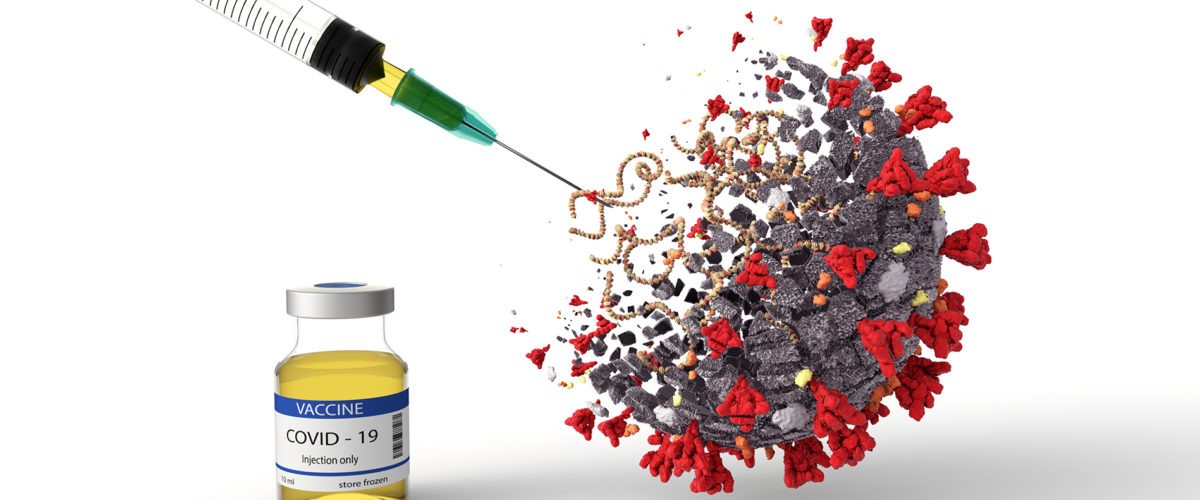Recent surveys of adult Americans may connect the dots between the role of politics, race and religion and attitudes about the pandemic and COVID-19 vaccines.
A study by Pew Research Center examined respondents’ intentions to get vaccinated, while a report by Public Religion Research Institute observed how faith, ethnicity and party affiliation predisposes belief in conspiracy theories that undermine trust in public health polices and institutions. And a study by political scientists uncovered a correlation between populist attitudes and rejection of the science around the coronavirus.
Faith, ethnicity and party affiliation predisposes belief in conspiracy theories that undermine trust in public health polices and institutions.
Pew found growing dissatisfaction with how the pandemic has been handled by local, state and national politicians and health officials. Research also reveals skepticism around precautions such as closing restaurants.
“Still, at the outset of President Joe Biden’s term, there’s more optimism than pessimism that the policies of his administration will improve the country’s response to the outbreak,” Pew reported. “There’s also a shared sense that vaccination efforts will play some role in improving the economy — a top public priority.”
Intention to be vaccinated
The survey also found a rise in intention among Americans to receive the vaccine, while a significant percentage already has been vaccinated. “Taken together, 69% of the public intends to get a vaccine — or already has — up significantly from 60% who said they planned to get vaccinated in November.”
 Broken down by religious affiliation, the Pew survey found that Catholics, at 77%, were most likely to say they have been vaccinated or intend to do so. Among the 62% of Protestants in that category were white non-evangelicals at 70%, Blacks at 64% and white evangelicals at 54%.
Broken down by religious affiliation, the Pew survey found that Catholics, at 77%, were most likely to say they have been vaccinated or intend to do so. Among the 62% of Protestants in that category were white non-evangelicals at 70%, Blacks at 64% and white evangelicals at 54%.
Americans who identified as religiously unaffiliated were by far most likely to say they already have or definitely/probably will be vaccinated, with atheists at 90% and agnostics at 80%, Pew said.
Political leanings also were found to contribute to the level of acceptance of the COVID-19 vaccine. “A large majority of Democrats and Democratic leaners (83%) intend to get vaccinated or have already received a vaccine, up 14 points since November. There has been a more modest 6-point increase among Republicans and Republican leaners (from 50% to 56%). As a result, the partisan gap has grown from 19 points in November to 27 points in the current survey.”
But Pew also identified another predictor of intended vaccination — trust in health care systems and in the development process for the vaccines.
“Almost all (96%) of those with a great deal of confidence in the research and development process say they plan to get a vaccine for COVID-19 or have already received one,” the polling group said. “By contrast, a majority (77%) of those with not too much or no confidence in how the vaccines were developed say they will not get vaccinated.”
Wariness of the pandemic explored
Other research projects, meanwhile, illuminate why some Americans are highly suspicious not only of COVID-19 vaccines, but of scientific understandings of the pandemic itself.
One “overlooked set of predispositions might also shape COVID beliefs and attitudes: populism,” political scientists Mark Pickup and Dominik A. Stecula reported in their February 2021 paper, “How populism and conservative media fuel conspiracy beliefs about COVID-19 and what it means for COVID-19 behaviors.”
The authors discovered a direct connection between pandemic denial and the victim mentalities connected with conspiracy beliefs.
This kind of populism “is a worldview that pits average citizens against ‘the elites’ and, importantly in the context of a pandemic, it includes anti-intellectual attitudes such as distrust of experts (including scientists),” Pickup and Stecula said.
“Those who believe the conspiracy theories about COVID-19 are less likely to adapt behaviors recommended by public health officials.”
“Furthermore, we find that conservative media consumption tends to be a stronger predictor of conspiracy belief among those high in populism than among those low in populism. We also show that these beliefs have consequences: those who believe the conspiracy theories about COVID-19 are less likely to adapt behaviors recommended by public health officials.”
Politics, religion and conspiracy theories
In its research around politics, religion and conspiracy theories, PRRI said it found that Americans are divided over whether the coronavirus was created intentionally in a lab (50%) or it developed naturally (49%)” — even though there is no credible evidence of the claim that COVID-19 was created by human intention.
Researchers weighed public trust in public institutions and officials, including Donald Trump and Joe Biden, Anthony Fauci and public health organizations.
“In general, the more Americans trust various leaders, experts or institutions to provide accurate information about the virus, the less likely they are to believe that the coronavirus was intentionally created in a lab,” PRRI reported. “However, we observed the opposite relationship with then-president Donald Trump: The more Americans trusted Trump, the more likely they were to believe the virus was lab-made.”
 Percentagewise, relatively few Americans actually trusted the former president when it came to the pandemic, according to the survey: 14% said they trusted him a lot, and 24% a little. Another 61% said they did not trust Trump at all.
Percentagewise, relatively few Americans actually trusted the former president when it came to the pandemic, according to the survey: 14% said they trusted him a lot, and 24% a little. Another 61% said they did not trust Trump at all.
“Americans were twice as likely to place a lot of trust in then-Democratic presidential nominee Joe Biden (28%), while more than three in ten trusted Biden a little (32%) or not at all (39%).”
By party affiliation, Republicans were much more likely to say they trusted Trump’s handling of the pandemic (39%) than independents (9%) and Democrats (1%), PRRI said.
White evangelicals expressed the most faith in Trump (33%) of any religious group. Next in line were white mainline Protestants at 20%, Hispanic Protestants at 19% and white Catholics and Hispanic Catholics at 17% and 11%, respectively.
“Fewer than one in ten non-Christians (8%), other Christians (8%), religiously unaffiliated Americans (7%), and Black Protestants (2%) trusted Trump a lot to provide accurate information on the virus,” according to PRRI.
Related articles:
Virginia vaccine coordinator appeals to churches to minimize skepticism of COVID vaccine


